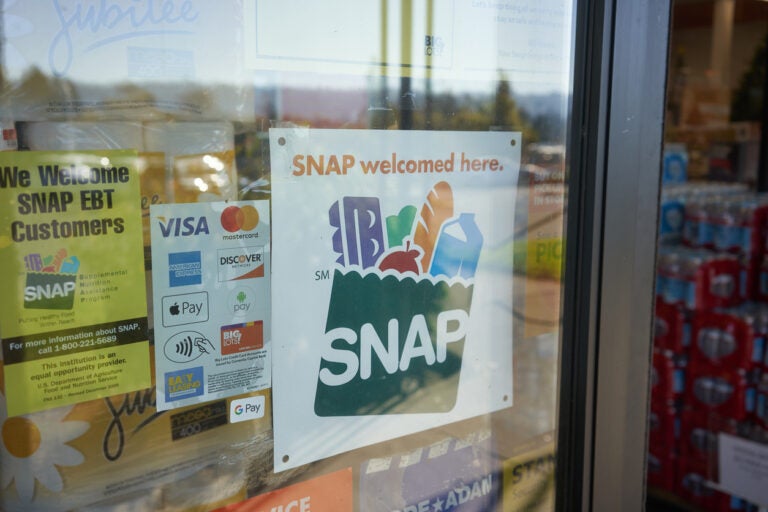Pennsylvania elected officials warn proposed federal cuts could be ‘devastating’ for social services
A spending bill Republicans passed in July also includes major cuts to the Supplemental Nutrition Assistance Program, also known as SNAP.

SNAP "welcomed here" sign is seen at the entrance to a Big Lots store. (FILE Photo)
This story originally appeared on WESA.
Local elected officials and social service providers — already struggling with the fallout of President Donald Trump’s cuts to safety net programs — say another round of potential budget cuts could be “catastrophic.”
The federal budget “isn’t abstract,” said Allegheny County Executive Sara Innamorato. “It directly shapes our ability to deliver public health services, keep people housed, invest in sustainability, support our main streets, support research and public media, and so much more.”
Innamorato and U.S. Rep. Summer Lee on Monday gathered a panel of nonprofit officials, service providers, and key county department heads to share how scaled-back federal funding has already impacted local communities, and the threats posed by proposed cuts.
Allegheny County received $373 million in direct federal funding last year, Innamorato said, plus additional federal money distributed by the state. Now, leaders in both the public and the private sectors are navigating diminished federal support and increased costs on everything from labor to construction materials. As the belt tightens and budgets strain, they’re expecting to face difficult choices — potentially reducing services, delaying or canceling projects and programs, or passing price hikes on to taxpayers and consumers.
“In short, everything’s been destabilized,” said Jordan Golin, president and CEO of Jewish Family and Community Services. The nonprofit provides social and legal services to refugees and immigrants, with the help of government funding.
But in January, the Trump administration halted federal aid for refugee resettlement efforts, and ordered groups including JFCS to stop providing federally contracted services to refugees already in the country. Those contracts were later reinstated, Golin said, and county and city officials stepped in to fill a funding shortfall. But rather than return to a schedule in which those contracts were renewed annually, the administration reviews the contracts every three months.
Golin said that practice, along with ramped-up deportations and moves to limit immigrants’ access to public programs, has put continued pressure on JFCS.
Republicans have characterized that and other moves as attempts to reduce federal spending amid soaring deficits, and to focus government aid on the truly needy.
But providers like the Greater Pittsburgh Community Food Bank are reeling from cuts to a multi-million-dollar U.S. Department of Agriculture program that allowed Pennsylvania food banks to purchase food directly from local farms. The nonprofit lost $5 million this year through federal cuts, officials say, and food banks in the Feeding America Network said they expect a 690 million pound decrease in food purchases next year.
A spending bill Republicans passed in July also includes major cuts to the Supplemental Nutrition Assistance Program (SNAP), sometimes referred to as food stamps, exacerbating food insecurity and sending more people to food banks.
Recently implemented paperwork requirements placed new rules and time limits for many adults who use SNAP, don’t work, and don’t have children. More people will be subject to the rule by Nov. 1, and the Greater Pittsburgh Community Food Bank is preparing for an influx of demand, said Colleen Young, the group’s director of government affairs.
By the time full SNAP changes go into effect, the Greater Pittsburgh Community Food Bank estimates 28,000 people in its 11-county service area will lose benefits.
The fact that the state budget, another key source of funding, is more than two months overdue has also complicated the financial picture. Young said the food bank has already been forced to dip into strategic reserves to fill the funding gap and address climbing demand.
“And because of that ongoing impasse of the state budget, we also don’t know if the increases we’ve requested to support additional food purchases will be available this year,” she added. “We’re asking our community of supporters who have always been generous in times of need to once again help us through this challenge.”
Trump’s proposed 2026 budget would slash the federal Community Development Block Grant (CDBG) program. Last year, that program provided the county with $13.1 million for investments in projects in smaller municipalities that otherwise don’t have the tax base to complete waterline and sewer repairs, sidewalk ramps, or other critical infrastructure.
CDBG allocations have decreased over time, said Allegheny County Economic Development director Lauren Connelly. And as the cost of construction continues to rise, “Those projects will become further deferred maintenance and become critical quality-of-life issues for communities across the county.”
Money for affordable housing could also be on the chopping block, leaving local governments to pick up the costs.
The uncertainty causes “deep, deep impacts as it trickles down through our states, through our counties, and down into our municipalities,” said Lee.
“This would be the largest wealth transfer from the working class to the very rich that we’ve ever seen,” she added. “ It’s a lot to digest.”
WHYY is your source for fact-based, in-depth journalism and information. As a nonprofit organization, we rely on financial support from readers like you. Please give today.






